2024 Winter Reading Guide

Feeling lost in logistics? Fear not! Inbound Logistics has curated a bookshelf of the best supply chain management books, from beginner-friendly guides to advanced strategy tomes. Dive into data-driven insights, uncover industry secrets, and learn to navigate today’s ever-evolving business environment.
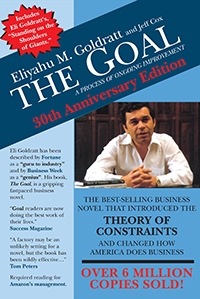 The Goal: A Process of Ongoing Improvement
The Goal: A Process of Ongoing Improvement
(30th Anniversary Edition)
By Eliyahu M. Goldratt
Since its initial publication, The Goal has transformed management thinking throughout the world. The novel tells the story of Alex Rogo, a harried plant manager working desperately to save his plant before corporate headquarters closes it down, with hundreds of job losses. It takes a chance meeting with a professor from his student days to help Alex break with conventional ways of thinking to see what he needs to do. The story of Alex’s fight to save his plant contains a serious message for all managers, and explains the ideas behind the author’s Theory of Constraints.
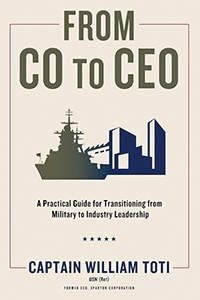 From CO to CEO: A Practical Guide for Transitioning from Military to Industry Leadership
From CO to CEO: A Practical Guide for Transitioning from Military to Industry Leadership
By Captain William Toti, U.S. Navy (retired)
Employment instability post-military is one of the biggest stress-inducing factors in a veteran’s life, contributing to serious concerns such as PTSD and failure to thrive. In addition, high turnover rates among veterans cost companies millions. The author provides nuts-and-bolts advice for both veterans and the companies that want to help their military veteran employees succeed.
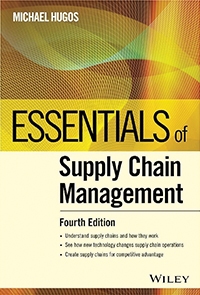 Essentials of Supply Chain Management
Essentials of Supply Chain Management
4th Edition
by Michael H. Hugos
From a clear explanation of fundamental concepts to insightful discussion of supply chain innovation, this book offers readers a comprehensive introduction to supply chain management with ideas they can put to use immediately. The fourth edition has been updated to reflect the current state of the field, with coverage of the latest technologies and new case studies that illustrate critical concepts in action. Readers will learn the fundamental concepts behind supply chain management, how supply chains work, and how to measure their performance.
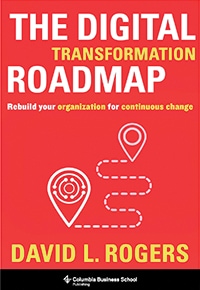 The Digital Transformation Roadmap: Rebuild Your Organization for Continuous Change
The Digital Transformation Roadmap: Rebuild Your Organization for Continuous Change
By David L. Rogers
With the acceleration of new technologies, every organization knows it must embrace digital transformation to survive. But across industries, established companies are held back by bureaucracy, inertia, and old ways of working. How can businesses break through to drive real change? This book provides the answer. The author identifies the biggest barriers to digital transformation and shows how any business can evolve by heeding the lessons of companies such as Disney, Walmart, Mastercard, Air Liquide, and the New York Times Company.
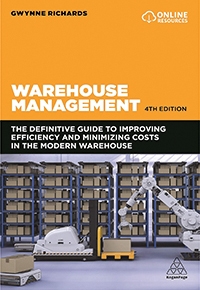 Warehouse Management: The Definitive Guide to Improving Efficiency and Minimizing Costs in the Modern Warehouse
Warehouse Management: The Definitive Guide to Improving Efficiency and Minimizing Costs in the Modern Warehouse
by Gwynne Richards
The fourth edition of Warehouse Management is fully updated to include the latest technologies in warehousing. The book explains robotics, cobots, and AI and their impact is situated alongside discussions on the future of warehousing. Also included are new case studies from companies that have achieved improvements and cost savings by introducing new technology and equipment, leaner processes, and environmental initiatives. The book covers an extensive range of key topics, from defining the modern warehouse and detailing management processes, strategies, and practices to tackling environmental challenges to ensure a sustainable supply chain.
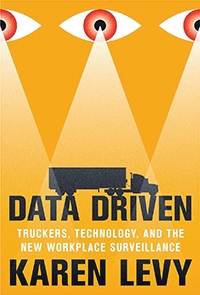 Data Driven: Truckers, Technology, and the New Workplace Surveillance
Data Driven: Truckers, Technology, and the New Workplace Surveillance
By Karen Levy
Long-haul truckers increasingly find themselves under many watchful eyes. Federal regulations require truckers to buy and install digital monitors that capture data about their locations and behaviors, supporting additional surveillance by trucking firms and other companies. This book examines how digital surveillance is upending life and work on the open road, and how truckers are challenging and resisting them.
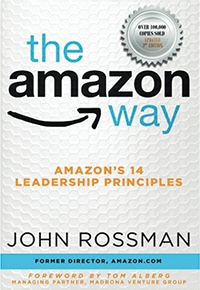 The Amazon Way: Amazon’s 14 Leadership Principles
The Amazon Way: Amazon’s 14 Leadership Principles
By John Rossman
Looking to emulate the Amazon way? In this business guide, the author, a former Amazon executive and expert advisor, provides an unrivaled view into Amazon’s unique culture and management practices. Sprinkled with entertaining and enlightening firsthand anecdotes from his time working with Amazon CEO Jeff Bezos, Rossman reveals the lessons that propelled Amazon from a simple online bookseller to a global “everything store.”
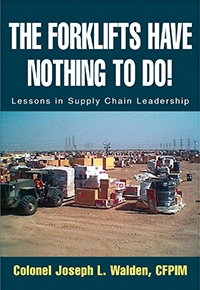 The Forklifts Have Nothing To Do! Lessons in Supply Chain Leadership
The Forklifts Have Nothing To Do! Lessons in Supply Chain Leadership
by Colonel Joseph L Walden
The author has spent more than 25 years leading supply chain operations and believes that improving your supply chain will improve your bottom line, regardless of your industry. Supply chain operations in the military are very similar to supply chain operations in commercial industry; both have the ability to improve operations for the customer. The author’s recommendations for improving supply chain operations draw on examples in civilian industry and military operations, including his experiences in Operation Iraqi Freedom.
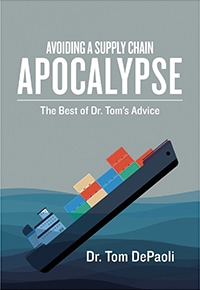 Avoiding a Supply Chain Apocalypse: The Best of Dr. Tom’s Advice
Avoiding a Supply Chain Apocalypse: The Best of Dr. Tom’s Advice
By Dr. Tom DePaoli
As the importance of supply chain management continues to grow, supply chain professionals must develop multiple options and proficient tactics to ensure the continuity of the supply chain. In this creative guide, the author offers practical strategies and tactics, learned and tested from his purchasing and supply chain career. There is no one-size-fits all in the supply chain, so he recommends a multi-faceted, diverse approach to avoiding supply chain meltdowns.
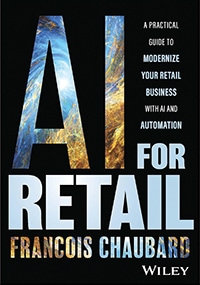 AI for Retail: A Practical Guide to Modernize Your Retail Business
AI for Retail: A Practical Guide to Modernize Your Retail Business
By Francois Chaubard
In today’s ever-evolving digital age, artificial intelligence (AI) is proving to be the transformative force that can make or break retail businesses of all scales—from international giants like Amazon to local mom-and-pop shops. This book helps readers understand and integrate AI into their retail business. It covers a diverse range of topics, from enhancing customer service and warehouse operations to innovating checkout processes, pricing, loss prevention, and demand forecasting and planning.
 Last Mile: How Startups Solve the Challenge of Delivering to Your Door
Last Mile: How Startups Solve the Challenge of Delivering to Your Door
By Chris Jordan and Joe Weber
Anyone can start a business, but no one has entirely solved the problem of missed deliveries. Written by the founders of startups in the UK parcel delivery space, this book combines real-life experiences from business leaders with e-commerce statistics and academic theories. This book will help anyone to better understand last-mile delivery logistics.
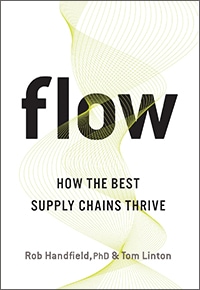 Flow: How the Best Supply Chains Thrive
Flow: How the Best Supply Chains Thrive
By Rob Hadfield and Tom Linton
When supply chains don’t flow—like in 2020 during the pandemic—problems such as shortages, medical emergencies, and economic shutdowns occur. This book provides a framework for ensuring continuity of supply and explores the future of supply chains in a post-pandemic world. The authors provide specific recommendations on what to do to improve supply chain flows, and include important insights for managers with examples of how companies such as Biogen, General Motors, Siemens, and Flex responded to the pandemic.
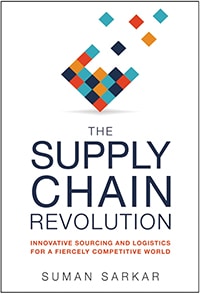 The Supply Chain Revolution
The Supply Chain Revolution
By Suman Sarkar
An increasing number of companies fail annually due to old-school approaches to supply chain management. Currently, once-leading companies like Walmart, Pfizer, HP, and The Gap are struggling while other companies succeed. The key factor is the way company leaders perceive their supply chain. While some see it as a means to cut expenses, others consider it a tool to exceed competitors. This book is a valuable guide for those in supply chain leadership positions looking to make more successful alliances and streamline their operational strategy. Through sharing practical solutions and real-life examples, The Supply Chain Revolution delves into the complexities of sourcing and logistics in today’s highly competitive marketplace.
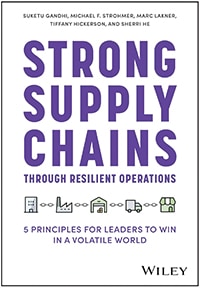 Strong Supply Chains Through Resilient Operations
Strong Supply Chains Through Resilient Operations
By Suketu Gandhi, Michael Strohmer, Marc Lakner, Tiffany Hickerson, and Sherri He
This book encapsulates a broad range of the authors’ latest thinking on the need to replace “lean” operations with “resilient” ones, and how companies across industries are gaining success by taking a more dispersed approach to operations and supply chain. The authors anchor the book in five business principles of resilient operations: build resilience against supply shocks by empowering your supply base; build resilience against demand shocks by using your operations to create customer value; create resilient teams by leaning into new ways of working and the benefits of diversity; enable resilience through technology by combining human judgment with artificial intelligence; and ensure long-term resilience by embracing sustainability.
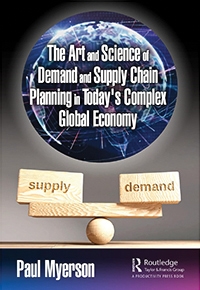 The Art and Science of Demand and Supply Chain Planning in Today’s Complex Global Economy
The Art and Science of Demand and Supply Chain Planning in Today’s Complex Global Economy
by Paul Myerson
The demand and supply chain planning process has evolved from a disjointed, slow, manual set of processes to an integrated, timely process enabled by the use and coordination of highly trained people, lean, agile processes, and cutting-edge technology. This book helps readers understand and apply the concepts, tools, and techniques used in the efficient supply of goods and services in today’s changing global economy. It also outlines how businesses, through their supply chain, work both internally and with their trading partners to build strong relationships and integrate demand and supply planning activities across the supply chain to deliver customer value efficiently and effectively.
